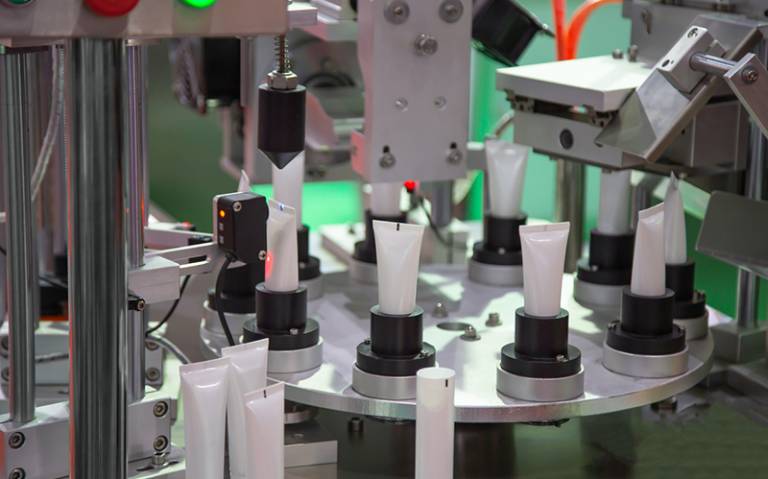Optimising manufacture of oral health care products using rheological modelling
UCL’s research and development of rheological model and computational fluid dynamics (CFD) simulations has improved manufacturing and design processes in several industries.

12 April 2022
Oral care products such as toothpaste and gels play an important part in maintaining good oral healthcare and preventing diseases.
Great advances in the quality, function and effectiveness of these products have been made in recent years. But the increased sophistication and complex rheological behaviour of the products’ components poses new challenges for manufacturers, with time-consuming lab testing and extensive feasibility studies at pilot and production scales.
Highly viscous, non-aqueous formulations have different rheological behaviour compared to their aqueous counterparts and often require longer mixing times while they are temperature sensitive.
Through an industrial partnership between Professor Panagiota Angeli and Dr Luca Mazzei in UCL’s Department of Chemical Engineering and large oral healthcare product manufacturer, a systematic approach has been developed to characterise the complex rheology of non-aqueous oral formulations and to improve mixing for current formulations.
Helping create more efficient manufacturing processes
The UCL team’s rheological model has been implemented in a Computational Fluid Dynamics (CFD) code that has been successfully validated against experimental data.
The model can be used to design more efficient manufacturing process routes for complex fluids and has also been extended to solid suspensions and their behaviour during mixing. Understanding the relationship between temperature and viscosity has allowed manufacturers to improve the efficiency of the mixing process for oral healthcare products and to reduce batch cycle times.
Companies are now able to respond to consumers’ higher demands for products that reduce tooth-sensitivity in markets in the UK and worldwide in Romania, Saudi Arabia, the US, and South America. The research helped reduce manufacturing costs and CO2 emissions and supported the increase in annual turnover of the industrial partner.
Application across other industries
UCL’s rheological model has also been implemented by petrochemical and sustainable technology companies and is being used in other processes, for example, to predict the flow and separation of liquid dispersions in pipes relevant to transport of multiphase mixtures and to pharmaceutical purifications.
It is also used as a fast-technical assessment tool for new non-aqueous formulations and has allowed accurate risk assessment when working in near critical conditions, reducing the need for costly pilot-scale trials.
Professor Angeli and Dr Mazzei said: "The UCL team’s work has contributed to a brand worth £270 million in book value and to a 7% growth in oral health sales. The work also leads to reduced waste and transport of excess materials that will help companies’ commitment to reducing their carbon footprint."
Research synopsis
Rheological model for optimised manufacturing of oral healthcare products
UCL research to understand the properties of complex mixtures used in toothpaste and gels has led to the development of a rheological model and computational fluid dynamics (CFD) simulations to improve manufacturing processes and design in industries from oral healthcare to petrochemicals and sustainable technologies.
Oral care products such as toothpaste and gels play an important part in maintaining good oral healthcare and preventing diseases. Great advances in the quality, function and effectiveness of these products have been made in recent years. But the increased sophistication and complex rheological behaviour of the products’ components poses new challenges for manufacturers, with time-consuming lab testing and extensive feasibility studies at pilot and production scales.
Links
- Professor Panagiota Angeli's academic profile
- Dr Luca Mazzei's academic profile
- UCL Department of Chemical Engineering
- UCL Faculty of Engineering
- UCL Faculty of Engineering REF 21
Image
- Image credit: iStock Itsanan Sampuntarat
 Close
Close

